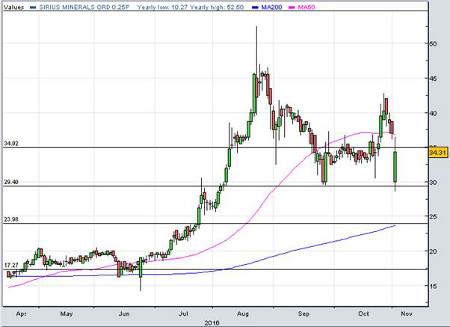Sirius Minerals slumps despite £1bn windfall
2nd November 2016 14:29
by Lee Wild from interactive investor
Share on
has flagged up a widely-anticipated Stage 1 financing plan. It's a massive day for the AIM-listed firm, developing a huge potash mine in North Yorkshire, and comes hot on the heels of last week's royalty deal with Australian billionaire Gina Rinehart. But while there is clearly reason to celebrate, a deeply discounted share placing has caused shareholders some short-term pain.
With $300 million (£244 million) from Rinehart's Hancock Prospecting already in the bag, a placing and open offer will bring in £330-£400 million (existing shareholders, including private investors, will be eligible 10% of that will be made available to private investors), and a convertible bond offering another $400-$450 million. That takes the total to around $1.2 billion.
That money is guaranteed as JP Morgan has underwritten the fundraise, but pricing the placing at 20-30p a share - a discount of between 18.9% and 45.9% to last night's closing price - had the shares down as much as 22% first thing Wednesday at a three-month low. In reality, however, it could have been worse.
This financing package tells us a lot about the final capital structure of the business
Sirius's bankers are now busy drumming up support for the financing, trying to secure the best terms possible. We should get an idea of how successful they've been, and whether it's nearer 20p or 30p, by the end of tomorrow, if not before.
Understandably, managing director and CEO Chris Fraser is optimistic. "I'm really, really pleased, and hopefully shareholders should feel good about where we are," he told me Wednesday.
"This is an institutional-led raising predominantly," he said. "It'll bring a bunch of new names into the stock and existing guys too."
A commitment to move from AIM to the main market would also trigger automatic qualification for inclusion in the FTSE 250 index, obligating tracker funds to buy the shares.

This initial slug of cash will bankroll site preparation costs, mine shaft excavations, tunnel caverns and project management. The money is expected to last no longer than three years after construction begins, and although the total capital funding requirement was slashed earlier this year from $3.6 billion, Sirius still needs $2.9 billion in all.
Ambitious project
Sirius will need Stage 2 financing in place well before then. This next tranche of financing, supplemented by operating cash flows from initial production, will cover costs for tunnelling, the mineral transport system (MTS), mine fit out, the materials handling facility at Teesside, and outsourcing charges linked to the harbour facilities.
Given Sirius does not plan to raise any additional equity on Stage 2 financing, this financing package tells us a lot about the final capital structure of the business and hence the dilution impact of Stage 1 funding.
"At the bottom end of the range (min price, max equity allocation, min convertible allocation) we calculate a post dilution NPV [net present value] per share of 98p, or £1.44 on the eve of production," writes joint house broker Liberum.
"At the top end of the range (max price, max convertible allocation, min equity allocation) we calculate a post dilution NPV per share of £1.24, rising to £1.81 on the eve of production."
And Yuen Low, mining analyst at Shore Capital which is also working on the fundraise, is typically bullish.
"While Sirius is currently at development stage and still some years from becoming a cashflow-generating company, an investment in Sirius will become progressively de-risked and should enjoy significant value uplift as it advances towards production" he says.
"We are currently reviewing our risked NPV estimate pending the finalisation of the Stage 1 financings, but we have no qualms in reiterating our 'buy' recommendation."
This article is for information and discussion purposes only and does not form a recommendation to invest or otherwise. The value of an investment may fall. The investments referred to in this article may not be suitable for all investors, and if in doubt, an investor should seek advice from a qualified investment adviser.